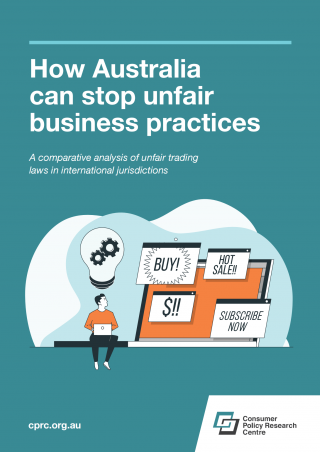How Australia can stop unfair business practices
Unfair business practices cause consumer harm but currently, there’s a gap in our laws to effectively protect Australian consumers.
This report:
explores laws that ban or restrict unfair practices across Europe, United States, United Kingdom and Singapore
highlights lessons Australia can learn from international approaches to implementing unfair trading laws
outlines the elements that Australia could consider when implementing an effective unfair trading prohibition.
What can we learn

The eight key lessons Australia can learn from international approaches:
1. Understand who the law protects
2. Harm is more than just losing money
3. Account for new and emerging issues
4. Clarity and flexibility are key
5. Poorly resourced regulators mean delayed outcomes for consumers
6. Inadequate penalties and consumer redress stifle widespread change
7. Inconsistency across the same jurisdiction creates regulatory arbitrage
8. Unfair trading laws don’t replace existing protections; they complement them
Key considerations for stopping unfair business practices in Australia
CPRC recommends lawmakers to consider some key elements when developing unfair trading laws in Australia:
Clear guidance on definitions and scope
Well-resourced regulators
Effective process to address new and emerging unfair practices
Penalties and enforcement action that adequately deter businesses
Meaningful redress for consumers
Practices found to be unfair overseas are swiftly stopped in Australia too
Consumer harm not just limited to financial or reputational loss but also impact on mental health
Where to from here?
Together, we have the opportunity to shape how Australian consumers today, and in the future, can be adequately protected and empowered to confidently participate in and reap the benefits of a fair, safe and inclusive market.
CPRC welcomes the opportunity to work further on this issue with government, regulators, policy makers, academia and the community sector.
If you are in one the above groups and would like a one-on-one briefing for your organisation, contact Chandni Gupta on chandni.gupta@cprc.org.au.
About the Author

Chandni Gupta
Digital Policy Director
Chandni leads CPRC’s research stream on protecting consumers in a digital world. Her work to date includes exploring the consumer shift from the analogue towards the digital economy, the impact of deceptive and manipulative online design on Australian consumers and the key gaps that currently exist in Australia’s consumer protections.



